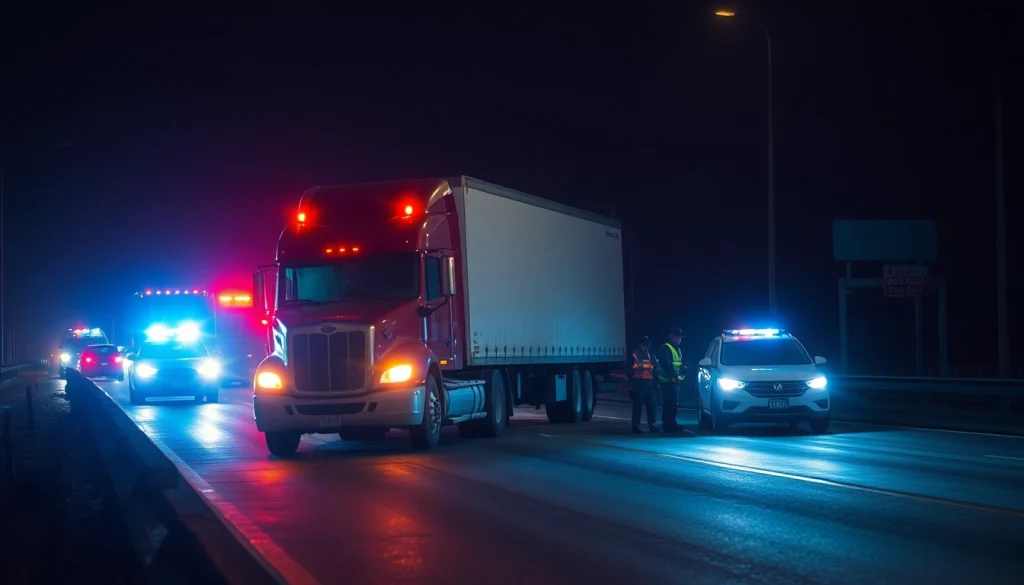
Understanding Truck Accidents: Causes and Consequences
Truck accidents can lead to devastating consequences, not only for the individuals directly involved but also for their families and communities. Understanding the factors that contribute to these accidents and their far-reaching effects is critical for anyone navigating the aftermath of such incidents. If you’ve experienced the trauma of a truck accident, it’s essential to seek assistance from experienced Nationwide Truck Accident Attorneys who can guide you through the complex legal landscape.
Common Causes of Truck Accidents
Several factors contribute to truck accidents, and understanding these can aid in prevention and provide insights into legal claims. Here are some of the most common causes:
- Driver Fatigue: Truck drivers often face long hours on the road, leading to fatigue, which significantly impairs their driving abilities.
- Distracted Driving: Whether from texting, using GPS, or other distractions, focusing less on the road poses severe risks.
- Speeding: Due to tight schedules and pressure from employers, truck drivers may exceed speed limits, increasing the severity of accidents.
- Improper Maintenance: Trucks require regular maintenance; neglecting this can lead to brake failures, tire blowouts, and other mechanical failures.
- Weather Conditions: Inclement weather, such as rain, snow, or fog, creates hazardous driving conditions that require extra caution.
- Inexperienced Drivers: Lack of training and experience in handling large vehicles can lead to poor judgment on the road.
Impact of Truck Accidents on Victims
The impact of truck accidents can be profound and often catastrophic. Victims may face physical injuries that require extensive medical treatment, rehabilitation, and sometimes lifelong care. Emotional trauma can also result, with many individuals experiencing anxiety, PTSD, and depression as they navigate their recovery.
The economic repercussions of a truck accident can also be severe. Victims may experience lost wages due to an inability to work, steep medical bills, and potential long-term care costs. Furthermore, the effects can ripple outward, imposing burdens on families and loved ones who must provide support during recovery.
Legal Responsibilities of Truck Drivers and Companies
Both truck drivers and the companies that employ them have legal responsibilities to ensure safety on the road. Truck drivers must adhere to traffic laws, remain within driving hour regulations, and prioritize safety over speed. Employers are responsible for hiring qualified drivers, providing adequate training, and maintaining vehicles in accordance with safety standards.
When accidents occur, determining liability can be challenging. Accountability may extend beyond the driver to the trucking company, manufacturers, and even third-party maintenance providers, depending on the specifics of the case. This complexity underscores the necessity of legal representation to navigate the nuances of truck accident law.
Why You Need Nationwide Truck Accident Attorneys
After a truck accident, having skilled legal representation becomes crucial to secure the compensation you deserve. Nationwide truck accident attorneys understand the unique challenges associated with these cases and are equipped to advocate for your rights.
The Role of Attorneys in Truck Accident Cases
Attorneys specializing in truck accidents play several key roles:
- Investigation: They conduct thorough investigations to gather evidence, including accident reports, witness statements, and expert testimonials.
- Negotiation: Lawyers negotiate with insurance companies on your behalf to maximize potential settlements.
- Legal Advice: Providing insight into the legal process, rights, and potential outcomes helps you make informed decisions.
- Representation: Should your case go to court, attorneys represent you and present a compelling case to ensure your interests are protected.
How to Choose the Right Truck Accident Attorney
Selecting an attorney requires careful consideration. Here are some essential factors to consider:
- Experience: Look for attorneys with a solid track record in handling truck accident cases specifically.
- Reputation: Research reviews and testimonials from past clients to gauge satisfaction and effectiveness.
- Communication: Choose an attorney who communicates clearly and is responsive to your needs and questions.
- Fees: Understand their fee structure, whether it’s a contingency fee model or hourly rates, ensuring it aligns with your budget.
What to Expect from Your Legal Representation
Once you hire an attorney, here’s what you can typically expect:
- Case Evaluation: Your attorney will assess the details of your case to determine the best legal strategy.
- Regular Updates: They will keep you informed about your case’s progress and any developments that arise.
- Access to Resources: Skilled attorneys often have access to expert witnesses, accident reconstruction specialists, and medical professionals.
- Final Settlement: Ultimately, they will work towards securing a fair settlement, whether through negotiation or trial.
Steps to Take After a Truck Accident
Knowing the steps to take following a truck accident can greatly impact the outcome of any ensuing legal action. Here’s a guide to follow:
Immediate Actions for Accident Victims
If you’ve been in a truck accident, prioritize your safety and health:
- Seek Medical Attention: Even if injuries seem minor, it’s critical to get evaluated by a healthcare professional.
- Contact Authorities: Notify the police, as they will create an official accident report necessary for any legal claims.
- Do Not Admit Fault: Avoid discussing the accident details or admitting fault at the scene; liability is complex and often not immediately clear.
Documenting the Accident Scene Effectively
Documenting the scene of the accident can be invaluable for your case:
- Take Photos: Capture images of the vehicles, damage, road conditions, and any visible injuries.
- Gather Witness Information: Collect contact details of any witnesses who can corroborate your account of the accident.
- Record Your Account: Write down your recollection of events while details are fresh, which can help your attorney.
Gathering Evidence for Your Claim
Assemble evidence to bolster your claim:
- Police Report: Ensure you obtain a copy of the official report detailing the accident.
- Medical Records: Keep a record of all medical treatment received, including bills and diagnoses.
- Vehicle Damage Assessment: Document all vehicle repairs and the associated costs to demonstrate economic losses.
Common Challenges in Truck Accident Claims
Truck accident claims can be fraught with challenges that require strategic navigation. Being aware of these hurdles can help you prepare effectively.
Handling Insurance Companies
Insurance companies often aim to minimize payouts. Here’s how to deal with them:
- Do Not Accept Initial Offers: Initial offers are usually much lower than what you may be entitled to; consult your attorney before responding.
- Document Everything: Keep detailed records of all communications with the insurance company for future reference.
- Stay Professional: Maintain a professional demeanor; avoid confrontations or aggressive behavior.
Proving Liability in Truck Accidents
Proving liability in a truck accident case can be intricate due to multiple parties involved. Consider the following:
- Understand Comparative Negligence: Many states operate on comparative negligence laws, meaning fault can be shared among multiple parties.
- Gather Strong Evidence: Utilize witness testimonies, expert opinions, and accident analyses to establish who is liable.
- Stay Updated on Regulations: Familiarize yourself with trucking regulations as they may impact liability determinations.
Dealing with Multiple Defendants
Truck accidents can involve various defendants, complicating claims:
- Identifying All Parties: Work with your attorney to find all potentially liable parties, which may include other drivers, the trucking company, or equipment manufacturers.
- Simplifying Complexities: Your attorney can help simplify the process and develop a cohesive legal strategy.
- Communication is Key: Ensure consistent communication with your attorney throughout the process, as this will aid in strategy implementation.
Maximizing Your Compensation for Truck Accident Injuries
Securing the compensation you deserve after a truck accident involves understanding the types of damages available and effective legal strategies.
Types of Damages You Can Claim
In truck accident cases, victims may be entitled to various forms of compensation, including:
- Medical Expenses: Compensation for all medical treatment related to the accident, including rehabilitation and future medical needs.
- Lost Wages: Reimbursement for income lost during recovery, as well as potential future lost earnings.
- Pain and Suffering: Compensation for physical pain and emotional distress experienced as a result of the accident.
- Property Damage: Reimbursement for vehicle repairs and other property related to the accident.
- Loss of Consortium: Compensation to spouses for the loss of companionship or support due to injuries sustained.
Strategies to Strengthen Your Case
To improve your chances of receiving fair compensation, consider the following strategies:
- Consult Experts: Engage accident reconstruction experts or medical professionals who can provide authoritative statements that support your case.
- Build a Strong Narrative: Work with your attorney to develop a comprehensive story that clearly represents your experience and injuries.
- Stay Organized: Maintain a detailed file with all relevant documents, medical records, and correspondence to streamline the process.
Working with Medical Experts and Witnesses
Professionals in various fields can significantly bolster your case:
- Medical Experts: Obtain evaluations from medical specialists who can testify about the extent of your injuries and necessary treatments.
- Witnesses: Secure statements from witnesses who corroborate your account, detailing how the accident occurred and the resulting impact.
- Documentation: Ensure all evidence is documented accurately to present a compelling case to the insurance company or in court.






